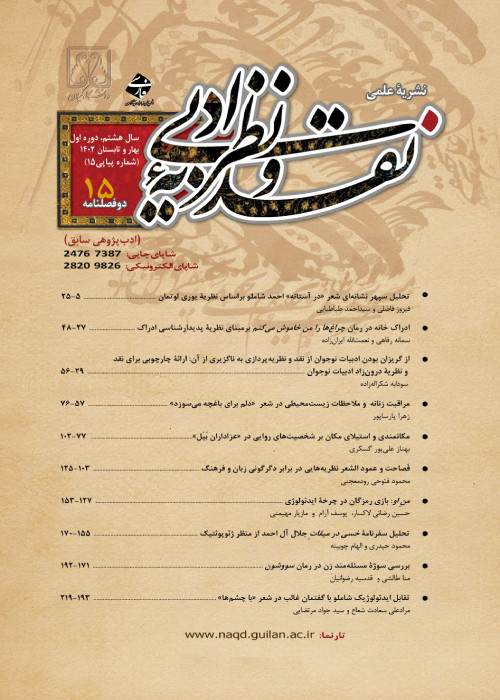‘Theory’ and ‘Story’ as Two Fundamental Linguistic Forms for Historiography: A Phenomenological-Existentialist Outlook
Author(s):
Article Type:
Research/Original Article (دارای رتبه معتبر)
Abstract:
The form of language or the way we speak about the (past) world is not neutral and insignificant. A formalist critique, of the kind put forward in the present paper, will show that, beyond the themes, purposes, methods, and approaches of our historical inquiry, the form of speaking chosen by, or often imposed on, us is decisive. The present article introduces two basic forms of speaking about a period in the human past: the theoretical and the story-based. This formalist study recognizes the forceful fascism of language and takes it most seriously. Nevertheless, it seeks to find a form appropriate to historical study, that is, a linguistic form which is able to avoid the excessive and innate desire of the human mind and language for appropriating the other and, ultimately, killing her/him. Employing the views of phenomenological and existentialist thinkers, the article introduces a story-based form that is able to speak about the sensory and primordial experience of man, and her/his being-in-the-world. Extended Abstract1.IntroductionThe present article studies the main forms of speaking about a situation – more specifically about a situation in the past – and tries to find out what forms of language can depict the specificity of a concrete social or material situation. Since language, according to thinkers such as Roland Barthes, is by nature fascist, speaking about a specific temporal-spatial condition is difficult, if not impossible. Since a historical representation of the past is, by definition, impossible, and the subject – i.e., the historian or researcher – is inevitably trapped in her/his subjectivity, such a representation becomes even more difficult. But a revolt in language against the nature of language is possible. The present paper seeks to study such a possibility through the ideas of phenomenologists and existentialists such as Merleau-Ponty, Heidegger and Gabriel Marcel. 2.Theoretical FrameworkTwo basic forms of speaking about a specific situation in the past have been identified in this paper: the theoretical form and the story-based form. Drawing on phenomenological-existentialist theories, the present article tries to show that unlike the theoretical form, the story-based form has its formal characteristics, consistent with the materiality, corporeality and specificity of the human condition, which can stand against the nature of language. 3.MethodologyThe present article has adopted a formalist approach. It compares two important linguistic forms in speaking about a specific situation and illustrates their characteristics by drawing upon phenomenological-existentialist theories. 4.Discussion and AnalysisThe present article reveals that unlike the theoretical form (either conceptual or narrative), the story-based form is able to realize historiographical ideals. We cannot speak about the existentialist experiences of concrete humans through an anti-existentialist, anti-concrete form. The story-based form is able to speak about the sensory and primordial experience of individuals and describe their being-in-the-world. This form can resist the human desire to appropriate the human beings living in the past. Therefore, this linguistic form, which relies on phenomenological-existentialist principles, is able to speak about the other. 5.ConclusionThree important conclusions can be drawn from the present study. First, to find out how successfully a specific situation (in the past) can be described, the form of narration is of paramount importance rather than content-related issues, such as the subject in question, the writer’s objectives, and her/his worldview and interests. Second, two fundamental, irreducible linguistic forms can be identified for the description of a specific situation: the theoretical form and the story-based form. Third, only the story-based form, because of its formal characteristics, is able to help realize the other-oriented ideals of the phenomenological-existentialist approach. Select BibliographyBarthes, R. 1393 [2014]. Dars. H. Noghrehchi (trans.). Tehran: Niloufar.Blackham, H. J. 1399 [2020]. Shesh Motafakker-e Existansialist. M. Hakimi (trans.). Tehran: Markaz.Gabriel, M. 1395 [2016]. Falsafeh-ye Existansialism. Sh. Eslami (trans.). Tehran: Negah-e Moa’ser.Heidegger, M. 1386 [2007]. Hasti va Zaman. S. Jomadi. Tehran: Qoqnous.Merleau-Ponty, M. 1966. Sens et Non-sens. Paris: Les Éditions Nagel.Merleau-Ponty, M. 2004. The World of Perception. O. Davis (trans.). London and New York: Routledge.Merleau-Ponty, M. 1391 [2012]. Jahan-e Edrak. F. Jaberolansar (trans.). Tehran: Qoqnous.Pietersma, H. 1398 [2019]. Nazaryeh-ye Ma’refat dar Padidarshenasi. F. Jaberolansar (trans.). Tehran: Kargadan.Primozic, D. T. 1388 [2009]. Merleau-Ponty, Falsafeh va Ma’na. M. R. Abolghasemi. Tehran: Markaz.Said, E. 1377 [1998]. Sharghshenasi. A. Govahi (trans.). Tehran: Pazhohheshgah-e Farhang va Andisheh Eslami.Todorov, T. 1394 [2015]. Adabyat dar Mokhatereh. M. M. Shojaee. Tehran: Mahi.
Keywords:
Language:
Persian
Published:
Literary Theory and Criticism, Volume:7 Issue: 1, 2022
Pages:
283 to 305
https://magiran.com/p2523255
دانلود و مطالعه متن این مقاله با یکی از روشهای زیر امکان پذیر است:
اشتراک شخصی
با عضویت و پرداخت آنلاین حق اشتراک یکساله به مبلغ 1,390,000ريال میتوانید 70 عنوان مطلب دانلود کنید!
اشتراک سازمانی
به کتابخانه دانشگاه یا محل کار خود پیشنهاد کنید تا اشتراک سازمانی این پایگاه را برای دسترسی نامحدود همه کاربران به متن مطالب تهیه نمایند!
توجه!
- حق عضویت دریافتی صرف حمایت از نشریات عضو و نگهداری، تکمیل و توسعه مگیران میشود.
- پرداخت حق اشتراک و دانلود مقالات اجازه بازنشر آن در سایر رسانههای چاپی و دیجیتال را به کاربر نمیدهد.
In order to view content subscription is required
Personal subscription
Subscribe magiran.com for 70 € euros via PayPal and download 70 articles during a year.
Organization subscription
Please contact us to subscribe your university or library for unlimited access!


